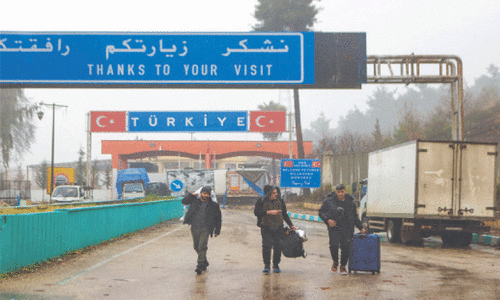NEW DELHI: India said on Wednesday it is sceptical about clinching a controversial nuclear deal with the United States, but will not give up trying to convince critics and opponents as the pact is key to the country’s growth.
New Delhi’s doubts over the fate of the deal, which has faced a rough ride since it was conceived in 2005, were voiced at the end of a parliament debate over the pact, which brought Prime Minister Manmohan Singh’s coalition to the brink of collapse.“If it fructifies ... if it happens, then you will find who is correct, who is not correct,” Foreign Minister Pranab Mukherjee told the upper house, a day after opposition lawmakers and communist allies once again slammed the deal.
Mukherjee said he was not sure of the deal going through “because there are so many hurdles”. He did not elaborate.
India still needs to conclude a safeguards agreement with the International Atomic Energy Agency, get the backing of the Nuclear Suppliers Group of nations and the approval of the US Congress before the deal can be sealed.
Analysts say not all these steps are expected to go through smoothly and within Washington’s informal deadline — the middle of next year, after which the US presidential election campaign is expected to hurt serious legislative business.
Previous governments in New Delhi had also faced a storm of domestic opposition when they initiated economic reform or joined the World Trade Organisation, but in hindsight those decisions were proved to be right, Mukherjee said.
“We were correct, you were wrong,” Mukherjee said. “I am not saying that you are going to be proved this time also but let us try, we are sincerely trying, we require energy, we require technology.”
The nuclear pact aims to end more than three decades of sanctions against nuclear commerce between New Delhi and Washington even though India has stayed out of the Non-Proliferation Treaty (NPT) and tested nuclear weapons.
But communist allies of Singh, as well as the Hindu nationalist opposition, have rejected it, saying it compromises sovereignty and imposes American influence.
The communists had threatened to end support to the government if it pursued key global approvals needed to clinch the deal, but relented to give a conditional go-ahead.
Mukherjee said he agreed with some lawmakers that nuclear energy seemed expensive now.
“Perhaps it will not appear too costly tomorrow,” he said.
“Let us not contain ourselves only for today, let us look at our future, let us look at our tomorrow.”
His comments came a day after the US envoy to India, David Mulford, told business leaders that Washington continued to encourage New Delhi to push the deal.
“In the recent period, we have been respectful of India’s democratic process, and will continue to be,” he said.—Reuters














































Dear visitor, the comments section is undergoing an overhaul and will return soon.